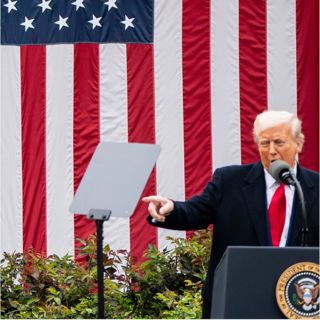
Trump Says They’re Foreign Gang Members. Are They?
In recent weeks, the Trump administration has deported hundreds of Venezuelan migrants by quickly labeling them as gang members and foreign enemies, and boarding them on planes to El Salvador. It’s sidestepping their rights to a court hearing where anyone might be able to scrutinize the claims against them.As a result, very little has been known about who these men are, or how they were targeted by immigration officials. Until now.Julie Turkewitz, the Andes bureau chief for The New York Times, explains who was actually on those planes, and discusses the secretive process that led to their deportations.Guest: Julie Turkewitz, the Andes bureau chief for The New York Times, based in Bogotá, Colombia.Background reading: Inside President Trump’s rushed effort to deport 238 migrants.The government is relying more on tattoos to identify gang members. Experts say that’s unreliable.For more information on today’s episode, visit nytimes.com/thedaily. Transcripts of each episode will be made available by the next workday. Photo: Alex Peña/Getty Images Subscribe today at nytimes.com/podcasts or on Apple Podcasts and Spotify. You can also subscribe via your favorite podcast app here https://www.nytimes.com/activate-access/audio?source=podcatcher. For more podcasts and narrated articles, download The New York Times app at nytimes.com/app.
23 Apr 29min

How Pope Francis Changed the Catholic Church
Church bells rang out across the world on Monday to mark the death of Pope Francis at the age of 88.Jason Horowitz, the Rome bureau chief at The New York Times, discusses the pope’s push to change the church, his bitter clashes with traditionalists, and what his papacy meant to the world’s 1.4 billion Catholics.Guest: Jason Horowitz, the Rome bureau chief of The New York Times.Background reading: For Jason Horowitz, Pope Francis was always a surprise.Francis’ death silences a voice for the voiceless.For more information on today’s episode, visit nytimes.com/thedaily. Transcripts of each episode will be made available by the next workday. Photo: Andrew Medichini/Associated Press Subscribe today at nytimes.com/podcasts or on Apple Podcasts and Spotify. You can also subscribe via your favorite podcast app here https://www.nytimes.com/activate-access/audio?source=podcatcher. For more podcasts and narrated articles, download The New York Times app at nytimes.com/app.
22 Apr 39min

Is the Era of Student Loan Forgiveness Officially Over?
Across the country, millions of Americans with unpaid student loans are discovering that years of patience and forgiveness from the U.S. government have officially come to an end.Stacy Cowley, a business reporter for The Times, explains what is behind the change of heart, sets out its financial consequences for borrowers — and discusses the larger reckoning that it may cause about how Americans pay for higher education.Guest: Stacy Cowley, a business reporter at The New York Times, with a focus on consumer finance.Background reading: Millions of student loan borrowers are behind on payments.For more information on today’s episode, visit nytimes.com/thedaily. Transcripts of each episode will be made available by the next workday. Photo: Seth Wenig/Associated Press Subscribe today at nytimes.com/podcasts or on Apple Podcasts and Spotify. You can also subscribe via your favorite podcast app here https://www.nytimes.com/activate-access/audio?source=podcatcher. For more podcasts and narrated articles, download The New York Times app at nytimes.com/app.
21 Apr 26min

The Sunday Read: ‘How Analytics Marginalized Baseball’s Superstar Pitchers’
One day at Wrigley Field in Chicago last May, Paul Skenes was pitching for the Pittsburgh Pirates, carving out a small piece of baseball history in his second big-league game. He struck out the first seven batters he faced. By the end of the fifth inning, he had increased his strikeout total to 10. More impressive, he hadn’t allowed a hit.Over the past two decades, analysts have identified a treasure trove of competitive advantages for teams willing to question baseball’s established practices.Perhaps the most significant of competitive advantages was hidden in plain sight, at the center of the diamond. Starting pitchers were traditionally taught to conserve strength so they could last deep into games. Throwing 300 innings in a season was once commonplace; in 1969 alone, nine pitchers did it. But at some definable point in each game, the data came to reveal, a relief pitcher becomes a more effective option than the starter, even if that starter is Sandy Koufax or Tom Seaver — or Paul Skenes. Subscribe today at nytimes.com/podcasts or on Apple Podcasts and Spotify. You can also subscribe via your favorite podcast app here https://www.nytimes.com/activate-access/audio?source=podcatcher. For more podcasts and narrated articles, download The New York Times app at nytimes.com/app.
20 Apr 31min

'The Interview': Nate Bargatze Doesn’t Mind if You Think He’s an Idiot
The self-deprecating stand-up comic discusses having a magician for a father, the challenge of mainstream comedy and his aspirations to build the next Disneyland. Subscribe today at nytimes.com/podcasts or on Apple Podcasts and Spotify. You can also subscribe via your favorite podcast app here https://www.nytimes.com/activate-access/audio?source=podcatcher. For more podcasts and narrated articles, download The New York Times app at nytimes.com/app.
19 Apr 34min

Do Trump Voters Like His Tariffs? We Went to Michigan to Find Out.
President Trump’s tariffs have terrified stock markets, business owners and anyone with a 401(k). Does that mean that his approach to trade is becoming a major political liability?Astead W. Herndon, a national politics reporter, asked voters in Michigan what they thought. He found that the answer to that question was not so simple.Guest: Astead W. Herndon, a national politics reporter and host of the politics podcast “The Run-Up.”Background reading: Video: Mr. Trump loves tariffs. Do all Americans?Here’s what six voters think of the administration’s latest actions.For more information on today’s episode, visit nytimes.com/thedaily. Transcripts of each episode will be made available by the next workday. Photo: Haiyun Jiang for The New York Times Subscribe today at nytimes.com/podcasts or on Apple Podcasts and Spotify. You can also subscribe via your favorite podcast app here https://www.nytimes.com/activate-access/audio?source=podcatcher. For more podcasts and narrated articles, download The New York Times app at nytimes.com/app.
18 Apr 30min

The Trial Mark Zuckerberg Couldn’t Prevent
Testimonies began this week in one of the most aggressive cases the government has ever brought against a big tech company. Over the next eight weeks, the Federal Trade Commission will argue that Meta, the company founded by Mark Zuckerberg, should be broken up.Cecilia Kang, who covers technology and regulatory policy, discusses the strange and contentious relationship between Mr. Zuckerberg and President Trump that has led to this moment, and what the case means for them.Guest: Cecilia Kang, a reporter covering technology and regulatory policy for The New York Times.Background reading: At trial, Mark Zuckerberg defended buying Instagram and WhatsApp.Tech C.E.O.s have spent millions courting the president. It has yet to pay off.For more information on today’s episode, visit nytimes.com/thedaily. Transcripts of each episode will be made available by the next workday. Photo: Tom Brenner for The New York Times Subscribe today at nytimes.com/podcasts or on Apple Podcasts and Spotify. You can also subscribe via your favorite podcast app here https://www.nytimes.com/activate-access/audio?source=podcatcher. For more podcasts and narrated articles, download The New York Times app at nytimes.com/app.
17 Apr 23min

Trump Trashed the Iran Nuclear Deal. Will His Be Any Better?
For years, President Trump has mocked the Obama administration for the nuclear agreement that it reached with Iran — a plan he disliked so much that he revoked it.Now, as he embarks on talks with Iran to reach a nuclear agreement of his own, the question is whether his administration can achieve a better deal.David E. Sanger, who covers the White House and national security, takes us inside the negotiations.Guest: David E. Sanger, the White House and National Security Correspondent for The New York Times.Background reading: President Trump wants a nuclear deal with Iran, but it must be better than President Barack Obama’s.Mr. Trump gives conflicting signals and mixed messages on Iran nuclear talks.For more information on today’s episode, visit nytimes.com/thedaily. Transcripts of each episode will be made available by the next workday. Photo: Eric Lee/The New York Times Subscribe today at nytimes.com/podcasts or on Apple Podcasts and Spotify. You can also subscribe via your favorite podcast app here https://www.nytimes.com/activate-access/audio?source=podcatcher. For more podcasts and narrated articles, download The New York Times app at nytimes.com/app.
16 Apr 28min





















